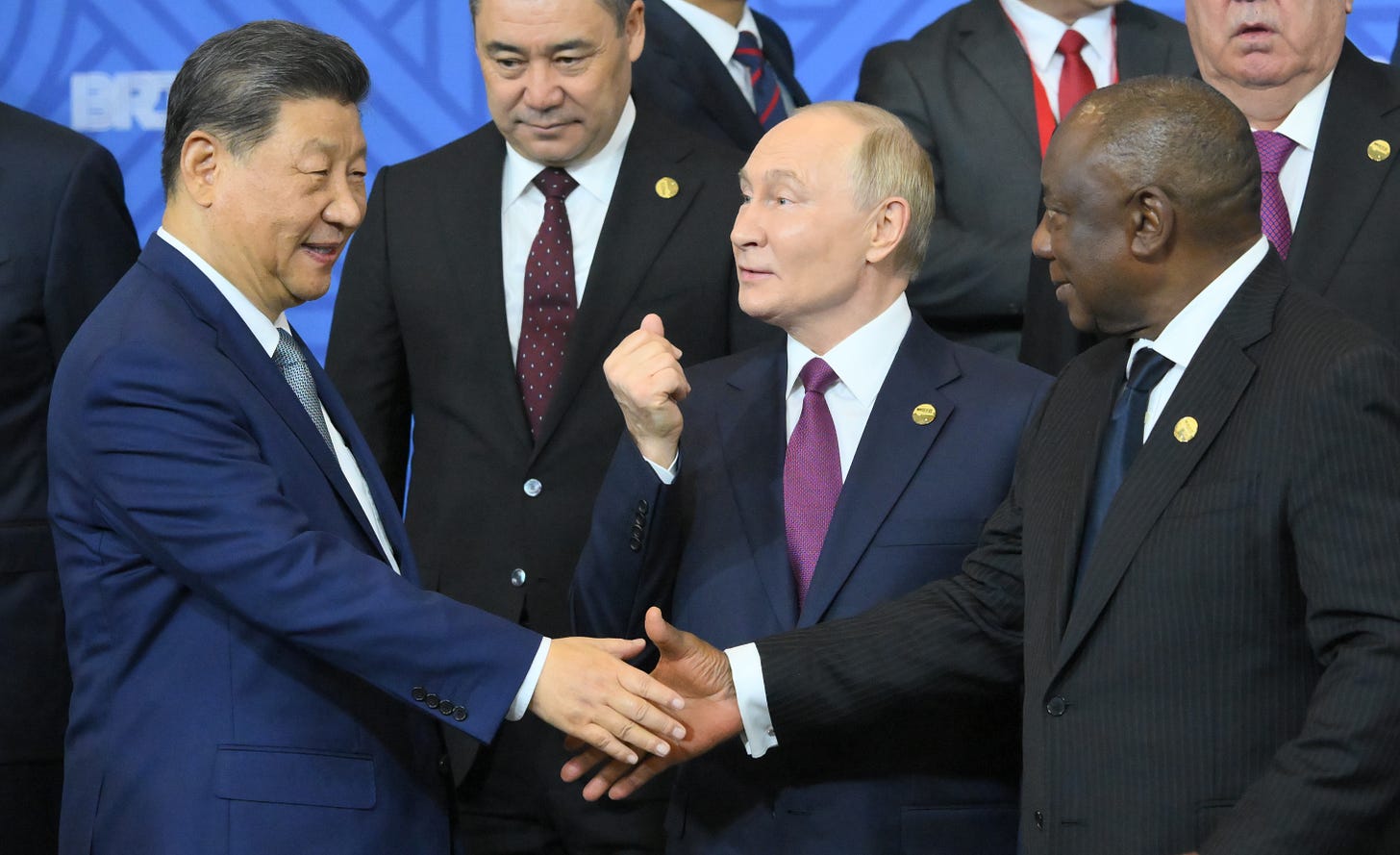BRICS is the Next Best Thing for Putin
BRICS represents nearly half of the Earth's population, but it represents too many conflicting interests to enter important agreements. But Putin shines as a host for them.
Vladimir Putin hosted the annual BRICS summit in Kazan, Tatarstan republic of the Russian Federation on 22–24 October. Putin was radiant with satisfaction from getting to show himself as host of a major international meeting, which does not happen so often, these days. But apart from the show, the results were meagre compared to what had been announced. The most noticeable things were who did not attend, and a guest appearance of the UN Secretary General.
The main outcome for Putin was that he was able to show the world that he is not standing alone. Not to say that all leaders present support him in his war against Ukraine, but by meeting up they showed at least that they are more interested in maintaining trade and diplomatic contacts.
Realistically, China and India have little shared interest and quite a few issues to contest. So they could not want to enter any formalized collaboration, and nothing strategic. It was also unrealistic that an equally historic project for a common economic platform for trade between the countries, as announced by the Russian hosts, would be agreed on. There was even a plan for a form of common digital currency that could make trade work around current sanctions policy, dollar-controlled commodity markets and other indignities. That did not emerge, either.
Even the announced plan of including up to 15 new members did not result in anything but mentions of good intentions to support a new ‘partnership’ category intended for developing countries (EDMCs) in the final document.
5. We welcome the considerable interest by countries of the Global South in BRICS and we endorse the Modalities of BRICS Partner Country Category. We strongly believe that extending the BRICS partnership with EMDCs will further contribute to strengthening the spirit of solidarity and true international cooperation for the benefit of all. We commit to further promoting BRICS institutional development.
The founding members of BRICS are, as the combined letters indicate: Brazil, Russia, India, China and South Africa (joined 2010). Iran, Egypt, Ethiopia, and the United Arab Emirates were announced to join at the summit in South Africa in 2023 and this was their first summit as member states. Argentina and Saudi Arabia were also invited in 2023 but Argentina withdrew their application after Javier Milei was elected president and Saudi Arabia is yet to officially join, as they are still considering the matter, they say.
Putin did not attend the South Africa BRICS summit last year out of fear that he might be arrested because of the ICC arrest warrant for him. He participated virtually.
Speaking about the arrest warrant, it is still in force, so Putin has restricted travel options. However, he was happy to show that some countries are still coming to Russia when invited.
UN Secretary General António Guterres addressed the BRICS summit with lengthy remarks, saying among other things:
I am grateful to participate in the sixteenth BRICS Summit. Collectively, your countries represent nearly half of the world’s population. And I salute your valuable commitment and support for international problem-solving as clearly reflected in your theme this year.
About Ukraine, he has these two sentences: “We need peace in Ukraine. A just peace in line with the UN Charter, international law and General Assembly resolutions.”
It was quite remarkable to see Guterres meet with Putin separately at the sidelines of the BRICS summit. Many western countries will see that as a lack of respect for the International Criminal Court that has issued an arrest warrant, concerning war crimes, for Putin. This is the first such warrant for a leader of a permanent member of the Security Council. All ICC member states have to adhere to the warrant and arrest Putin whenever he touches their jurisdiction.




